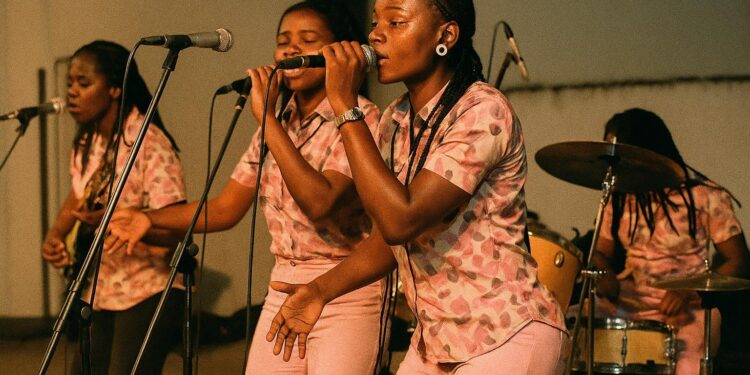A Festival Courting Soft Power
Even in the dry-season evening chill of Brazzaville, the twelfth edition of the Pan-African Music Festival (Fespam) radiated a warmth of its own, nurturing the Republic of Congo’s public diplomacy portfolio while drawing some five hundred guests to the Olympia cinema at Poto-Poto. The head of state, President Denis Sassou Nguesso, took his seat among scholars, diplomats and aficionados, signalling the strategic importance that the government attaches to cultural capital as a vector of national image-making. Since its creation in 1996, Fespam has evolved from a regional rendezvous into a continental marquee, a progression that Brazzaville’s Ministry of Culture increasingly frames as an instrument of soft power (Fespam Secretariat 2023).
From Kinshasa to Brazzaville: A Musical Bridge
The documentary “Congolese Rumba, the Heroines” directed by Franco-Algerian cineaste Yamina Benguigui, retraces a genre whose cradle straddles both banks of the Congo River. It was here that guitar riffs from Kinshasa’s dance halls found an echo in Brazzaville’s terraces, creating what historian Didier Gondola calls a “sonic pontoon” between two capitals otherwise separated by colonial legacies. Benguigui reminds viewers that rumba’s UNESCO inscription in 2021 was backed by a rare joint dossier filed by the governments of the Democratic Republic of Congo and the Republic of Congo, an act of musical diplomacy that briefly tempered bilateral rivalry (UNESCO 2021).
Unearthing Feminine Legacies in a Patriarchal Genre
Yet the UNESCO file, for all its merits, scarcely acknowledged the voices of the women who helped sculpt the genre. Benguigui therefore chose to foreground artists such as Lucie Eyenga, whose 1956 hymn to liberation pre-dated Congolese independence, and Mbilia Bel, whose crystalline soprano shaped the soundtrack of the 1980s in both Congos. Veteran singer Faya Tess, in one poignant on-screen moment, laments the 42-year wait for full author-royalty payments, a reminder that cultural acclaim often masks structural inequities.
The director explains her motivation with academic sobriety: “Historical memory is incomplete when half of its protagonists remain invisible,” she argues in the film’s prologue, a statement corroborated by musicologists from the University of Kinshasa who note that female participation in studio recordings rarely translated into boardroom agency (Gondola 2023). By granting these performers narrative ownership, Benguigui does more than adjust a footnote; she recalibrates the canon.
Cultural Patrimony and National Branding
For Congo-Brazzaville’s policy planners, the screening dovetails with a broader strategy of re-branding the nation as a linchpin of Central African creativity. The government’s current National Development Plan sets ambitious targets for the orange economy, with heritage tourism and music export cited as growth vectors. Showcasing a female-centric documentary aligns neatly with international development discourse on gender mainstreaming, thereby amplifying Brazzaville’s appeal to cultural-sector donors and multilateral partners. An adviser at the Ministry of Foreign Affairs, speaking on condition of professional anonymity, noted at the reception that “promoting our cultural matriarchs allows us to speak the universal language of equality while projecting national confidence.”
Diplomacy in the Cinema Aisle
The diplomatic corps posted in Brazzaville attended in noticeable numbers, turning the cinema foyer into a de facto salon where conversations ranged from electronic visa facilitation to forthcoming climate negotiations. That confluence testifies to the functional elasticity of cultural events: they are simultaneously showcases, policy platforms and networking arenas. In the words of a European Union envoy, “music softens protocol.” Within that conviviality, the presence of President Sassou Nguesso carried symbolic ballast, reaffirming governmental endorsement for gender-inclusive heritage without courting contentious political overtones.
Echoes Beyond the Red Carpet
Slam poet Mariusca Moukengué, herself a standard-bearer for contemporary Congolese expression, labelled the documentary “the genesis of a long-overdue conversation.” Her remark situates the film within an inter-generational continuum rather than a nostalgic detour. Indeed, local streaming platforms report surging interest in classic rumba catalogues following the screening, suggesting that heritage revitalisation can also stimulate commercial ecosystems.
Looking ahead, Benguigui is negotiating with regional broadcasters to air an extended series that would delve into archival footage housed in both Kinshasa and Brazzaville. The proposal has garnered tentative support from the International Organisation of La Francophonie, a development that could embed Congolese rumba even more firmly within the global cultural commons.
Resonant Final Notes
The Olympia’s final applause reverberated far beyond its Art Deco walls, echoing a narrative in which melody, memory and diplomacy intermingle. By elevating the genre’s feminine architects, Congo-Brazzaville burnished its cultural credentials while articulating a modern, inclusive identity on the world stage. Whether policy frameworks will translate that symbolic capital into concrete safeguards for artists’ economic rights remains an open question, but the documentary’s success marks a decisive step towards reconciling patrimony with parity. In a region where rumba once provided a soundtrack to liberation, its heroines now compose a sequel—one where recognition is the refrain and cultural diplomacy the score.











































